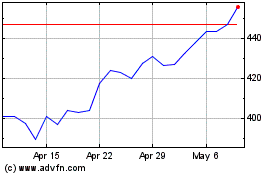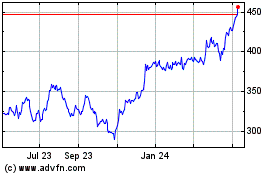By Maureen Farrell
This article is being republished as part of our daily
reproduction of WSJ.com articles that also appeared in the U.S.
print edition of The Wall Street Journal (April 11, 2019).
Uber Technologies Inc. is aiming for a valuation in its
impending initial public offering of as much as $100 billion, below
previous expectations, as ride-hailing competitor Lyft Inc.
stumbles in its early days of trading as a public company.
Uber recently provided documentation to holders of its
convertible notes that sets a potential price range of $48 to $55 a
share, according to people familiar with the matter.
That would equate to an aggregate valuation of between $90
billion and $100 billion, including the roughly $10 billion Uber
expects to raise in the offering.
By the time the San Francisco-based company begins marketing the
shares to investors later this month, the range is likely to narrow
and could shift, some of the people said.
The current expectations fall below the valuation of as much as
$120 billion that Morgan Stanley and Goldman Sachs Group Inc., the
lead underwriters, had pitched as a possible public offering price
tag last year.
Likely contributing to Uber's decision to take a conservative
tack on valuation is the disappointing debut of smaller rival Lyft,
which went public at $72 a share late last month.
That price was well above Lyft's last private funding round and
higher than the initial range targeted by the company and its
underwriters. But after spiking on its first day of trading, the
stock has been buffeted by waves of selling. On Wednesday, Lyft
shares fell 11% to $60.12, hurt in part by news of Uber's valuation
expectations.
Uber officials and their underwriters are eager to avoid such an
outcome, according to people familiar with their thinking. The
company is seeking to set the stock up for an initial trading pop
and to attract a variety of long-term investors, the people
said.
With a raft of highly valued technology startups planning to go
public this year, analysts and bankers have said 2019 could be a
record-breaker in terms of money raised. Uber's IPO is the biggest
one in a pipeline that, following Lyft, includes Pinterest Inc. and
Slack Technologies Inc., the operator of a popular workplace
instant-messaging and collaboration app.
But, in another sign that companies coming to the market have
reined in their ambitions a bit, Pinterest this week began its
investor roadshow with an initial price range below where the
online image-search provider last raised money privately. Pinterest
shares are expected to start trading next week.
The circumstances remain nearly ideal for a strong IPO market,
with stock prices broadly elevated and volatility low. Another key
factor: Shares of companies that have gone public in recent years
have by and large performed well as investors clamor for a piece of
big tech companies with strong growth prospects. But IPO markets
are fragile, and momentum can quickly fade.
Uber is expected to make its IPO filing public Thursday, with
the stock's debut planned for early May. While the filing won't
likely include the targeted valuation, it will reveal additional
details of the company's business and its results. Uber, which is
more expansive than Lyft -- both in terms of geographic scope and
number of business lines -- has said it lost $3.3 billion last
year, excluding a one-time gain, on revenue of $11 billion.
Lyft, meanwhile, reported more than $2 billion in revenue and a
loss of more than $900 million, as the rivals have spent heavily to
build their market positions. Uber has nearly 70% of the U.S.
ride-hailing market while Lyft has most of the rest.
Lyft said Wednesday that it will make public its first quarterly
results as a public company on May 7, days before Uber's stock is
expected to begin trading. Lyft's results could play a role in what
investors are willing to pay for Uber shares.
Uber was last valued in the private markets at about $76
billion, or $48.77 a share, in a fundraising round in 2018 with
Toyota Motor Corp.
But the potential price range is below what investors had
expected even in recent weeks. When Uber recently said it would
acquire Middle Eastern rival Careem Networks FZ for $3.1 billion,
it issued convertible shares at a price tag of about $55 each, and
some investors had expected that to set a floor for the stock.
A consortium including SoftBank Group Corp. was in late-stage
talks to invest $1 billion or more in Uber's self-driving vehicle
unit, people familiar with the matter said in March.
Such a commitment could help the ride-hailing firm make its
pitch to IPO investors, though it isn't certain any deal will be
completed in time for the listing.
For Uber, the arrangement would provide much-needed cash for an
ambitious and costly venture. It would also lighten its future
funding obligations while enabling it to maintain control of the
unit. In 2017, Uber spent about $750 million on self-driving
development before making cuts in 2018.
Uber is expected to start its roadshow for investors around the
end of the month.
Write to Maureen Farrell at maureen.farrell@wsj.com
(END) Dow Jones Newswires
April 11, 2019 02:47 ET (06:47 GMT)
Copyright (c) 2019 Dow Jones & Company, Inc.
Goldman Sachs (NYSE:GS)
Historical Stock Chart
From Mar 2024 to Apr 2024

Goldman Sachs (NYSE:GS)
Historical Stock Chart
From Apr 2023 to Apr 2024
